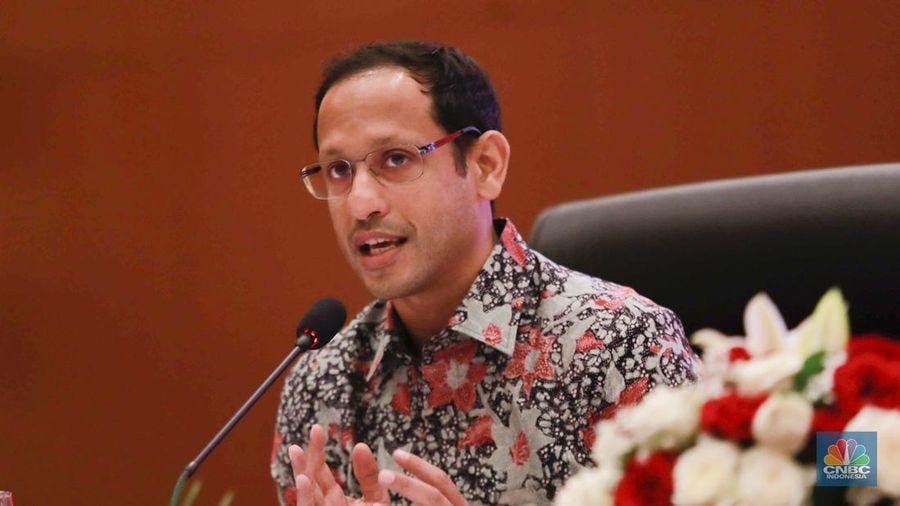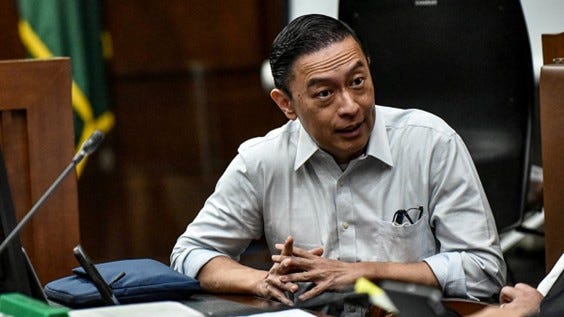Gojek's Nadiem Entangled in Education Corruption Scandal
UPDATE on Gojek founder's legal troubles in corruption-riddled education ministry
By: Ainur Rohmah
The Attorney General’s Office has ordered Nadiem Anwar Makarim, one of Indonesia’s brightest business stars, jailed for 20 days as a suspect in a corruption case tied to the government’s digital education program and the procurement of Chromebook laptops between when he was Minister of Education, Culture, Research and Technology.
Nadiem, speaking to reporters after being named a suspect, denied wrongdoing. “I did not commit any crime,” he said. “God will protect me. The truth will come out. For me, throughout my life, integrity and honesty come first.”
As our August 1 story reported, many in the business community say the probe of Nadiem, a Harvard Business School alumnus and former McKinsey consultant and one of the major stars in Indonesia’s business firmament, may have been sparked somehow by a soured relationship with President Prabowo Subianto. Nonetheless, it has long been clear that Indonesia’s Education Ministry faces serious corruption problems including illegal contracts, misuse of funds and lack of transparency and accountability in budget management.
Nadiem, who many regard as arrogant for his own good, was brought in by then-President Joko Widodo in 2019 to reform Indonesia’s deeply substandard education program. He initiated the Chromebook program, which drew more than Rp9 trillion (US$548,8 million) in state funding and was originally heralded as a key component in the country’s bid to modernize the system. A source told Asia Sentinel that although they are simpler and cheaper, they operate off the Internet. In 2023, Indonesia's Internet penetration rate reached 77 percent, with 212.9 million people online, meaning a full quarter of the population had no access.
Investigators now say the Chromebook initiative was riddled with irregularities and driven by ulterior motives. A source told Asia Sentinel that although Nadiem’s current legal status remains that of a witness, Indonesia’s Attorney General’s Office is reportedly working to build a case around him, focusing on testimonies and evidence—particularly from Jurist Tan, a former special adviser to Nadiem who remains a fugitive.
Many in the business community liken Nadiem’s problem to that of Thomas Lembong, also Harvard-educated, who formerly served as Indonesia’s trade minister between August 2015 and July 2016, who eight years later was named a suspect in a sugar import corruption case. Last week, Lembong was sentenced to 4½ years in prison and fined Rp750 million (US$46,000) for improperly granting sugar import permits despite an acknowledgement that Lembong hadn’t profited personally as trade minister. He was granted legal clemency yesterday (July 31) by Prabowo Subianto and freed.
The widespread suspicion in Jakarta is that Lembong’s mistake was serving as campaign manager for candidate Anies Baswedan in last year’s presidential election, which he lost to Prabowo, who is known for his penchant for vengeance.
Politics or no, the state is believed to have lost Rp1.98 trillion (US$121.4 million) as a result of the Chromebook procurement policy, including Rp480 billion from unnecessary software licenses for Chrome Device Management (CDM) and Rp1.5 trillion in laptop price markups. Indonesia Corruption Watch (ICW), the anti-graft watchdog, stated that government procurement often becomes vulnerable to corruption, especially when specifications are overly narrow and appear forced.
“This creates room for corruption schemes, including price inflation, kickbacks from vendors, and illegal levies during distribution,” the group said. ICW further warned that narrowing the laptop specification solely to Chromebooks while requiring high levels of domestic content (as mandated by the government’s TKDN program) inevitably paved the way for monopolistic practices, benefiting only a handful of suppliers.
Since late May, prosecutors have interrogated at least 28 witnesses, including two of Nadiem’s former special staffers. According to Siregar, investigators sought to reconstruct how decisions were made—both during policy formulation and implementation stages—in an effort to expose any corrupt intent. Nadiem himself was summoned twice, on June 23 and July 15, each time questioned intensively for 12 and 9 hours, respectively, focusing on whether Nadiem had received any personal or corporate benefits, particularly regarding Google’s investment in Gojek during his time as the company's CEO, and how that relationship may have influenced the ministry’s decision to procure Chromebooks.
On July 8, prosecutors raided the Jakarta office of PT GoTo Gojek Tokopedia Tbk (GoTo), the holding company that includes Gojek, seizing a range of materials including documents, correspondence, and electronic storage devices. Authorities say the raid was conducted following the discovery of links between the company and the Education Ministry’s procurement scheme.
Prior to entering government service, the 41-year-old Nadiem had a glittering career in business. He co-founded Gojek, an on-demand platform that offers transportation, food delivery, logistics, and other services. Under his leadership, Gojek rose from a startup to become one of “decacorns” globally, with a valuation exceeding US$10 billion. Nadiem’s achievements earned him a spot on Bloomberg 50 in 2018 as a transformative economic innovator, and in 2019, he became the youngest Asian recipient of the 24th Nikkei Asia Prize for Economic and Business Innovation.
His role in building Gojek also earned him a place on Globe Asia’s 2018 list of the 150 richest Indonesians. Citing his tech credentials and reformist appeal, President Joko Widodo appointed Nadiem to lead the Education Ministry during his second term from 2019 to 2024. Upon accepting the position, Nadiem resigned from all executive and board roles at Gojek and formally severed all operational ties with the company.
Nadiem has denied any wrongdoing in the Chromebook procurement case. In a recent press statement, he defended the project as both necessary and lawful. “The procurement went through a comprehensive assessment and followed all applicable regulations,” he said. During his tenure, the ministry distributed over 1.1 million laptops, along with 3G modems and projectors, to more than 77,000 schools over four years. Nadiem argued that the Chromebook acquisition was essential at the time as part of a broader strategy to mitigate the risk of ‘learning loss’ during the COVID-19 pandemic, when all in-person learning was suspended nationwide.
He further contended that Chrome’s operating system is cheaper, unlike other platforms that require costly licensing, especially if schools want to activate safety features that protect students and teachers from online risks such as pornography, gambling, and video games. “For comparable specifications, Chromebooks are consistently 10 to 30 percent cheaper,” he said. Nadiem also claimed the procurement process was conducted under the supervision of multiple watchdog institutions, including the Attorney General’s Office, the Competition Commission, and the Financial and Development Supervisory Agency, “to ensure transparency and minimize conflicts of interest.”
ICW urged the Attorney General’s Office to conduct a thorough investigation, arguing that special advisors have no formal authority in state procurement processes. “Investigating their role means probing deeper—into who gave the orders and how those orders were carried out,” the group said.
The Chromebook procurement scandal is merely the latest in a long line of corruption cases that have plagued Indonesia’s education sector. According to ICW, the sector is chronically vulnerable to corruption and consistently ranks among the most investigated by law enforcement agencies. From January 2016 to September 2021, there were 240 corruption cases in education alone, with estimated state losses totaling Rp1.6 trillion. “We believe the real losses are far greater, as many cases have yet to be fully quantified. We’ve also found numerous procurement projects that do not meet real needs or have been left unused due to incompleteness or abandonment,” the watchdog noted.
Findings by the Corruption Eradication Commission (KPK) have echoed these concerns. The agency has highlighted recurring abuses involving school aid funds, extortion, collusion in procurement, inflated costs, and falsified documents. Weak governance and insufficient oversight mechanisms allow these practices to persist, even as the national education budget continues to grow. From 2020 through 2025, the central government’s education allocation has steadily increased. In 2025 alone, the Ministry of Finance has earmarked Rp724 trillion, up from Rp665 trillion in 2024.
Nadiem is not only under scrutiny from the Attorney General’s Office. The KPK has also opened a preliminary investigation into its potential involvement in the procurement of Google Cloud services to support remote learning during the COVID-19 lockdown. While no suspects have been named, officials confirmed that the probe remains active and is focused on the rental system and suspected price markups.



